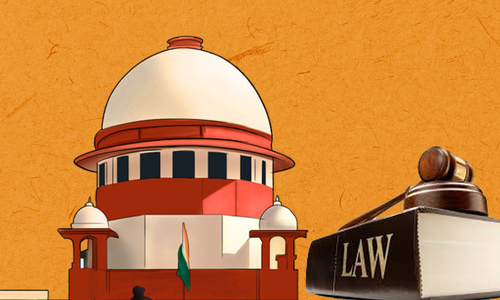In the profound words of the American philosopher Cornel West, “Never forget that justice is what love looks like in public.” The statement holds unique significance in the context of India. Here, the highest embodiment of public love, synonymous with justice, is vested in the revered institution— the Supreme Court of India.
From the pages of legal history scripted at the Supreme Court in 2023, OrissaPOST brings you a curated narrative of five pivotal judgments sorted in chronological order.
Demonetisation not flawed
In January this year, a five-member Constitution Bench of Supreme Court, by a 4:1 majority, upheld the decision taken by the Central government six years ago in 2016 to demonetise currency notes of Rs 500 and Rs 1,000 denominations.
The decision-making process cannot be faulted merely because the proposal emanated from the Central government, Justice Gavai had remarked.
Justice Nagarathna, in her dissenting opinion, held that the demonetisation exercise was unlawful purely on legal grounds despite the ‘noble objectives’ of the decision.
Mere membership can lead to UAPA
In April 2023, the Apex court reversed its earlier ruling which said that “mere membership of a banned organisation will not incriminate a person” under the Unlawful Activities (Prevention) Act, 1967, and Terrorist and Disruptive Activities (Prevention) Act, 1987, “unless he resorts to violence or incites people to violence and does an act intended to create disorder or disturbance of public peace by resort to violence”.
A three-judge bench of Justices MR Shah, CT Ravikumar and Sanjay Carol held that the court’s three decisions in 2011 which took the aforementioned view were “not a good law”.
“When an association is declared unlawful by notification issued under Section 3 of UAPA, a person who continues to be a member of such association is liable to be punished with imprisonment for a term which may extend to two years, and shall also be liable to fine under Section 10(a)(i) of the UAPA, 1967,” the court had said.
Pain reduced; no fundamental rights for bulls
A Constitution Bench of the Supreme Court May 18 upheld the amendments made by Tamil Nadu, Karnataka, and Maharashtra to the Prevention of Cruelty to Animals Act (PCA Act), 1960 permitting the traditional bull-taming sports of Jallikattu, Kambala and other bullock-cart races. The five-judge Bench overruled the view taken by a two-judge Bench of the court in its 2014 judgement banning such sports.
In its 2023 judgement, the Apex court said that the new amendments in PCA Act substantially reduce the pain and suffering caused to the participating animals and thus the manner in which the race was carried out has now been altered.”
Refusing to extend fundamental rights to animals, the court observed that it would not be prudent to bring bulls within the ambit of Article 21 which guarantees the right to life. It also noted that there is no precedent to show that the Constitution recognises any fundamental right for animals.
J&K was never sovereign state
A five-member Constitution Bench of Supreme Court December 11 unanimously upheld the power of the President to abrogate Article 370, a decision taken in August 2019, which led to the reorganisation of the full-fledged state of Jammu and Kashmir (J&K) into two union territories.
CJI Chandrachud wrote that there is much evidence in Article 370 and the J&K Constitution to show that a merger agreement was not necessary for Kashmir to surrender its sovereignty. Article 370(1) applied Article 1 of the Constitution (where J&K was listed as a Part III State) with no modifications. Section 3 of the J&K Constitution explicitly states that “the State of Jammu and Kashmir is and shall be an integral part of the Union of India.” Therefore, the Constitution of India, he said, “became the supreme governing document of the land.” Further, the CJI noted that the Preamble to the J&K Constitution shows a ‘clear absence of a reference to sovereignty’.
The Supreme Court further directed the Centre to expedite the process of restoration of statehood for J&K (without Ladakh) and ordered the Election Commission to conduct polls in J&K by September 30, 2024.
Insufficient stamping a ‘curable defect’
A seven-judge Constitution Bench led by Chief Justice DY Chandrachud December 13 unanimously upheld the validity of an unstamped arbitration agreement.
The court stated that the effect of not paying or insufficiently paying stamp duty renders an arbitration agreement inadmissible as evidence under the Stamp Act but does not make it void. Not stamping or insufficient stamping, the Bench said, was a curable defect.
What is ‘arbitration agreement’? It is an agreement by the parties to submit to arbitration all or certain disputes which have arisen or which may arise between them in future, in respect of a defined legal relationship. By entering into an arbitration agreement, the parties commit to submit certain matters to the arbitrators’ decision rather than have them resolved by law courts.
In summary, As 2023 draws to a close, the Supreme Court’s judgments have left an indelible mark on India’s legal framework and societal narratives. From affirming the constitutionality of demonetisation to navigating the delicate balance between human activities and animal rights, the judiciary played a pivotal role in shaping India’s legal narrative. Whether it be the reorganisation of Jammu and Kashmir or the nuanced stance on arbitration agreements, these decisions resonate as benchmarks that reflect the court’s commitment to justice and legal evolution. These landmark rulings will undoubtedly shape the trajectory of India’s jurisprudence for years to come.
In 2024, the Supreme Court anticipates a busy year with key cases on its docket, including the MP/MLAs bribe for vote, electoral bonds’ validity, Adani-Hindenberg, the Money Bill debate, and state government-led sub-classification of SCs-STs for reservation.
By Patit Mandal, OP
